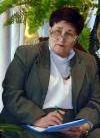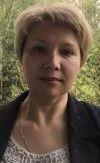Setkova I. N., Lukina A. R., Volkova M. A. NEW TEACHER ROLES IN DISTANCE LEARNING. LIFELONG EDUCATION: The 21st Century.
2021. № 1 (33).
DOI: 10.15393/j5.art.2021.6690
NEW TEACHER ROLES IN DISTANCE LEARNING
| | Setkova Irina N.
Director
Lyceum № 1
(Krasnoyarsk, Russian Federation)
lyceum1@mail.ru |
 | | Lukina Antonida R.
Ph. D in Philosophy, Associated Professor, Head of the Department of general and social pedagogy
Siberian Federal University
(Krasnoyarsk, Russian Federation)
antonida_lukina@mail.ru |
 | | Volkova Maria A.
Senior Lecturer at the Department of general and social pedagogy
Siberian Federal University
(Krasnoyarsk, Russian Federation)
kop-sfu@mail.ru |
Keywords:
teacher
distance learning
professional role
strategic management
teacher training
students
family. |
Abstract: this article presents the analysis of changes in the content of the activities of school principals and teachers, as well as forms and technologies of methodological and organizational support for teachers in the transition from traditional (full-time) learning to distance learning. The goals and objectives of modern education are formulated in terms of preparing a person for the future under the conditions of uncertain and divergent society, and his/her ability to respond to the current challenges.
The main approaches to the design of the educational process and the preparation of teachers for work in the context of the transition to distance learning are outlined on the example of the experience of Lyceum № 1 in Krasnoyarsk, Siberia. The restructuring of the lyceum management system and the conditions for its implementation are described including such characteristics as personal responsibility of school principals, their ability to «take a hit»; team work of the teaching staff, etc. We propose the format of the modular schedule, which makes it possible to significantly reduce the computer time for a student and to systematize the teacher's work.
The results of a teachers survey on the changes in their professional functions and roles under new conditions are presented. The data obtained demonstrate significant transformations of almost all pedagogical functions, mostly (according to the respondents answers), of the educational one. The traditional teacher roles have changed and new roles have emerged.
The necessity of constant teacher self-education under new conditions is argued and the support forms of this work are determined.
|
Paper submitted on: 02/26/2026; Accepted on: 02/25/2021; Published online on: 03/26/2021.
References
- Ansoff I. Strategic management. Moscow, 1989. 519 p. (In Russ.)
- Bauman Z. Liquid Modernity. Saint-Petersburg, 2008. 240 p. (In Russ.)
- Dryazgunov K. V. Formation of divergent thinking of senior pupils in social studies lessons. In: Obrazovanie i obshchestvo. 2003. № 1. P.132‒140. (In Russ.)
- Kondakov A. M., Sergeev I. S. Education in a convergent environment: problem statement. In: Pedagogika. 2020. № 12. P. 5‒23. (In Russ.)
- Lukina A. K. Krasnobrovkina I. N. Educational model of the school of social activity of a teenager. In: Peremeny. 2002. № 1. P. 31‒37. (In Russ.)
- Chernobay E. V. Davlatova M. A. Changing the professional roles of a teacher in the conditions of distance learning for schoolchildren: an actual view. In: Pedagogika. 2020. № 11. P. 100‒106. (In Russ.)
- Kolesnikova K. Teachers have more work «at a distance» [Electronic resource]. In: Novostnoj resurs «Rossiyskaya Gazeta». Russia, 2020. Electron. dan. URL: https://rg.ru/2020/04/03/oprosu-uchitelej-stalo-bolshe-raboty-na-udalenke. html? fbclid = IwAR3t5RLXin-8AdQYnngGth eT41a2UUxu0R1uPEsk2Q3qQ1M0q4mhdTde4k (date of access: 20.04.2020)]. (In Russ.)
- Luksha P. Education for a complex world. Book presentation [Electronic resource]. In: Prezentaciya knigi. Russia, 2020. Electron. dan. URL: https://rosuchebnik.ru/upload/iblock/780/780276327b856072bd5d282452d6a55e.pdf (date of access: 20.12.2020). (In Russ.)
- Markov B. V., Volkova S. V. Education in the digital era: the experience of philosophical understanding [Electronic resource]. Russia, 2020. Electron. dan. DOI: 10.15393/j5.art.2020.6051 (date of access: 12.12.2020). (In Russ.)
- Fishbein D. The ability to «keep the blow» came to the fore [Electronic resource]. Russia, 2020. Electron. dan. URL: https://vogazeta.ru/articles/2020/12/29/ pedagogika / 16122-dmitriy_fishbeyn_ umenie_derzhat_udar_vyshlo_na_pervyy_plan (date of access: 30.12.2020). (In Russ.)
- Griffin P., Gallagher C. Transforming teaching, learning, and assessment for competency based curricula [Electronic resource]. WoS, 2017. P. 5–12. Electron. dan. URL: http://www.ibe.unesco.org/sites/default/files/resources/transforming _teaching _learning_and_assessment.pdf (date of access: 20.12.2020).
- Al Ghazali F. Challenges and opportunities of fostering learner autonomy and self-access learning during the COVID-19 pandemic [Electronic resource]. WoS, 2020. Electron. dan. URL: https://doi.org/10.37237/110302 (date of access: 20.12.2020).
Displays: 3676; Downloads: 608;
DOI:
http://dx.doi.org/10.15393/j5.art.2021.6690













